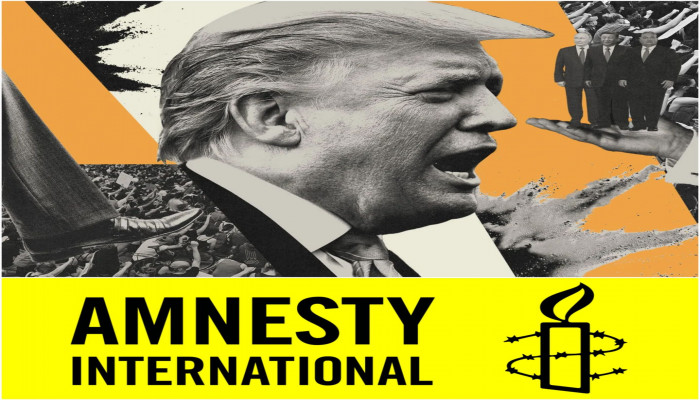Global law and human rights under greater threat since Trump returned to power: Amnesty International Report
- In Reports
- 02:23 PM, Apr 29, 2025
- Myind Staff
In its annual report released Tuesday, Amnesty International stated that the international framework for law and human rights is under increasing strain. This situation has deteriorated further since Donald Trump resumed the presidency in the United States. The rights group’s Secretary General, Agnes Callamard, stated, “Unprecedented forces are hunting down the ideals of human rights for all, seeking to destroy an international system forged in the blood and grief of World War Two and its Holocaust.”
In 2024, conflicts and human rights violations in regions like the Middle East, Sudan, Ukraine and Afghanistan left millions of lives shattered, with women in particular facing increasing restrictions on their freedoms. The report also criticised major global powers, including the US, Russia and China, for weakening progress in upholding international law and efforts to combat poverty and inequality.
Amnesty stated that although these “reckless and punishing offensives” had been happening for years, Trump acted as a “super-accelerator” of those developments. The current administration has halted US international aid and cut funding to several UN bodies. Callamard said that Trump’s second term began with a “multiplicity of assaults – against human rights accountability, against international law, and the UN,” and urged for “concerted resistance.” “While international justice mechanisms have taken important steps towards accountability in some cases, powerful governments have repeatedly blocked attempts to take meaningful action to end atrocities,” Amnesty expressed.
The criticism was mainly directed at nations that opposed rulings by the International Court of Justice in The Hague, which were made in response to South Africa’s accusation of genocide against Palestinians in Gaza. Countries such as Hungary were also called out for not carrying out arrest warrants from the International Criminal Court against Israeli leaders, including Prime Minister Benjamin Netanyahu, who are accused of committing war crimes and crimes against humanity.
According to the report, this year will be marked by the way “Israel’s military occupation grew ever more brazen and deadly” and by the fact that “the USA, Germany and a handful of other European states supported Israel.”
Amnesty accused Israel of carrying out a “live-streamed genocide” in Gaza, claiming it forced the majority of the population from their homes and intentionally triggered a humanitarian disaster. The organisation stated that Israel acted with the “specific intent to destroy Palestinians in Gaza, thus committing genocide.” Israel has consistently denied these accusations. The war in Gaza started on October 7, 2023, when Hamas launched a large-scale attack on Israel, killing 1,218 people, mostly civilians, according to official Israeli figures cited by AFP. Hamas also took 251 people hostage; 58 are still believed to be held, though the Israeli army says 34 of them have died. In retaliation, Israel began a military campaign aimed at eliminating Hamas. According to Hamas-run territory, Gaza’s health ministry, over 52,000 people, mostly civilians, have been killed so far.
Amnesty International, along with other organisations like Human Rights Watch (HRW) and Doctors Without Borders, has described the situation as “genocide”, a claim Israel firmly denies. Amnesty has also drawn attention to the humanitarian crisis in Sudan, where famine and fighting between the army and RSF paramilitary forces continue to devastate the country. Amnesty stated that the conflict had caused the “largest forced displacement crisis in the world,” displacing around 12 million people, yet it was met with “near-complete global indifference.”
On the other hand, the right organisation reported that violence and discrimination against women had “soared” in 2024, especially in conflict zones like Sudan and Afghanistan. In countries like Afghanistan, women are subjected to harsh laws under the Taliban that severely limit their freedoms.
The report also emphasised an “urgent need” for more decisive government action to regulate AI technologies to protect human rights. Additionally, it warned that more and more governments are misusing spyware and surveillance devices to target critics and dissenters.







Comments